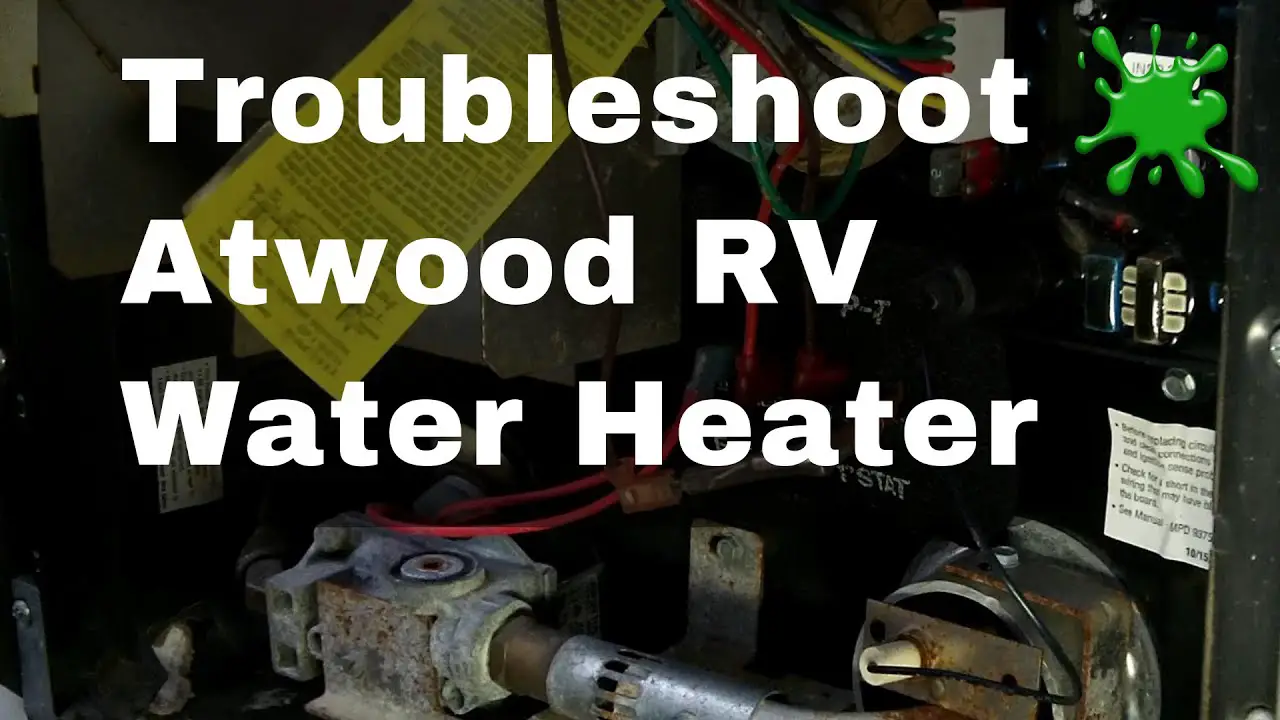The Atwood RV water heater may not be working on electric due to a faulty heating element or thermostat. We will discuss common issues and troubleshooting steps to help you resolve the problem and get your water heater back in working condition.
Are you experiencing issues with your Atwood RV water heater not working on electric? This can be quite frustrating, especially when you’re on the road and depend on your water heater for hot water. There could be a number of reasons causing this problem, such as a faulty heating element or thermostat.
We will explore common issues and provide troubleshooting steps to help you identify and resolve the issue with your Atwood RV water heater. By following these steps, you’ll be able to get your water heater up and running again in no time.

- Common Issues With Atwood Rv Water Heater
- Understanding The Electric Water Heater System
- Troubleshooting Steps For Electric Atwood Rv Water Heater
- Preventive Maintenance For Atwood Rv Water Heater
- Comparison: Electric Vs. Propane Atwood Rv Water Heaters
- Repair Or Replacement: Evaluating The Better Option
- Frequently Asked Questions Of Atwood Rv Water Heater Not Working On Electric
- Conclusion
Common Issues With Atwood Rv Water Heater
When it comes to enjoying hot water during your RV adventures, a malfunctioning Atwood RV water heater can certainly put a damper on things. Several common issues can be the culprit behind an Atwood RV water heater not working on electric. In this section, we will explore two of the most frequent problems: a faulty electric heating element and a tripped high limit switch.
Faulty Electric Heating Element
If your Atwood RV water heater is not heating the water on electric mode, there is a possibility that the electric heating element has become faulty. The electric heating element is responsible for generating heat and warming the water in the tank. Over time, electrical connections can become loose or damaged, leading to a loss in heating efficiency.
To diagnose this issue, you can follow these steps:
- Turn off the electrical power supply to the water heater at the circuit breaker.
- Inspect the heating element by carefully removing the access panel or cover located on the outside of the water heater. Be cautious as the element can be hot.
- Check for signs of damage such as visible cracks, discoloration, or obvious burn marks on the heating element.
- Tighten any loose connections between the electrical wires and the heating element.
- If the heating element is damaged, it will need to be replaced with a new one that matches the specifications of your Atwood RV water heater model.
Tripped High Limit Switch
Another common issue that can cause the Atwood RV water heater electric mode to stop working is a tripped high limit switch. The high limit switch is a safety feature that automatically shuts off the power to the heating element if the water temperature becomes too high.
To reset the high limit switch, follow these steps:
- Turn off the electrical power supply to the water heater at the circuit breaker.
- Locate the high limit switch, which is typically located near the top of the water heater tank. It may be a small red button or a switch.
- Press or flip the high limit switch to reset it.
After resetting the high limit switch, turn the power back on and check if the Atwood RV water heater is now functioning on electric mode. If the problem persists, it is recommended to consult a professional technician to further diagnose and resolve the issue.

Credit: m.youtube.com
Understanding The Electric Water Heater System
The electric water heater system in an Atwood RV might face issues with functionality. Troubleshooting and understanding the cause of an electric water heater not working can help resolve the problem efficiently.
Understanding the Electric Water Heater System When it comes to troubleshooting an Atwood RV water heater that is not working on electric, it helps to have a good understanding of how the electric water heater system functions. The electric water heater system consists of several components, each serving a specific function. In this section, we will break down the components of the electric water heater and explain the function of each component so that you can diagnose and fix any issues with your Atwood RV water heater.Components Of The Electric Water Heater
The electric water heater is composed of the following main components: 1. Heating Element: The heating element is responsible for heating the water. It is usually made of durable materials like copper, stainless steel, or titanium to withstand the high temperatures. 2. Thermostat: The thermostat is the control center of the electric water heater. It senses the water temperature and regulates the operation of the heating element accordingly. It ensures that the water is heated to the desired temperature and maintains it.Function Of Each Component
Now, let’s dive into the function of each component: 1. Heating Element: The heating element is the heart of the electric water heater system. When the electric power is supplied, the heating element converts the electrical energy into heat energy. This heat energy is transferred to the water, raising its temperature to the desired level. 2. Thermostat: The thermostat acts as a temperature regulator. It monitors the water temperature and sends signals to the heating element to turn on or off based on the set temperature. When the water temperature drops below the set level, the thermostat activates the heating element, and when the water reaches the desired temperature, the thermostat switches off the heating element. Understanding the function of these components is crucial when troubleshooting an Atwood RV water heater that is not working on electric. By inspecting and testing each component, you can identify the faulty part and replace it if necessary. Next, we will discuss common issues and their possible solutions in our upcoming section.Troubleshooting Steps For Electric Atwood Rv Water Heater
Welcome to our troubleshooting guide for Atwood RV water heaters! If you’re experiencing issues with your electric Atwood RV water heater, follow these simple steps to identify and resolve the problem. Below, we outline the key troubleshooting measures for checking power supply, testing heating element continuity, and resetting the high limit switch. Read on to get your Atwood RV water heater back up and running smoothly.
Checking Power Supply
First, ensure that the RV is plugged into a power source or the generator is running. Use a multimeter to check if the power supply to the water heater is functioning correctly.
Testing Heating Element Continuity
Remove the access cover and locate the heating element. Test for continuity using a multimeter to determine if the heating element is functioning as designed. If there is no continuity, the heating element may need to be replaced.
Resetting High Limit Switch
If the high limit switch is tripped, locate the switch and reset it. Ensure there are no obstructions blocking the ventilation and that the water heater is receiving adequate airflow to prevent the switch from tripping again.
Preventive Maintenance For Atwood Rv Water Heater
Routine Inspection
Regularly check for leaks and corrosion to ensure optimal performance.
Inspect wiring for any signs of wear and tear.
Look for loose connections and tighten as needed.
Flushing The Tank
Flushing the tank removes sediment buildup and helps maintain efficiency.
Turn off the water heater and allow it to cool before flushing.
Connect a hose to the drain valve and let the water flow out until clear.
Replacing Anode Rod
Periodically check the anode rod and replace if significantly corroded.
Unscrew the old anode rod using a wrench and replace with a new one.
Apply plumber’s tape to the threads before installing the new rod.
Comparison: Electric Vs. Propane Atwood Rv Water Heaters
When comparing electric and propane Atwood RV water heaters, it’s important to consider efficiency differences and the pros and cons of each type.
Efficiency Differences
- Electric water heaters are usually more energy-efficient than propane.
- Propane water heaters are known to heat water faster compared to electric ones.
Pros And Cons Of Each Type
| Electric Atwood RV Water Heaters | Propane Atwood RV Water Heaters |
|---|---|
| Pros | Pros |
|
|
| Cons | Cons |
|
|

Credit: community.goodsam.com
Repair Or Replacement: Evaluating The Better Option
Evaluating whether to repair or replace your malfunctioning Atwood RV water heater on electric can be a crucial decision. By weighing the costs, age, and extent of damage, you can determine the better course of action to ensure efficient and reliable hot water supply during your camping trips.
Repair or Replacement: Evaluating the Better Option Is your Atwood RV water heater failing to operate on electric power? You’re not alone. Many RV owners encounter this issue, leading them to contemplate whether it’s more practical to repair or replace the heater. Before making a decision, it’s crucial to understand the cost considerations and signs that indicate the need for a replacement. Cost Considerations When it comes to determining between repairing or replacing your Atwood RV water heater, cost considerations play a pivotal role. Repairing the existing unit may seem like the most economical choice upfront, but it’s essential to assess the longevity of the unit. On the other hand, opting for a replacement may involve a higher initial cost, but it can offer long-term benefits, including energy efficiency and improved performance. Signs for Replacement Signs for Replacement of your Atwood RV water heater should be carefully monitored to ensure the continued functionality and safety of your unit. Noticeable signs such as constant malfunctions, extensive corrosion, or a considerable drop in energy efficiency could indicate that the heater is beyond repair. Additionally, if the heater has reached the end of its lifespan, a replacement may be the most viable option to avoid recurring issues and ensure reliable hot water supply during your travels. By carefully weighing the cost considerations and recognizing the signs for replacement, you can make an informed decision regarding whether to repair or replace your Atwood RV water heater. Prioritizing long-term efficiency and reliability will help you ensure the comfort and convenience of your RV experience.
Credit: www.reddit.com
Frequently Asked Questions Of Atwood Rv Water Heater Not Working On Electric
Why Is My Atwood Rv Water Heater Not Working On Electric?
The Atwood RV water heater might not work on electric due to a faulty thermostat, heating element, or wiring issue. Check these components carefully and consult a professional if needed for troubleshooting and repair. Regular maintenance can also prevent such issues.
How Can I Troubleshoot My Atwood Rv Water Heater On Electric?
To troubleshoot an Atwood RV water heater not working on electric, first, ensure the power source is functioning. Check the thermostat and heating element for any defects. Properly inspect the wiring connections and make sure they are secure. Refer to the user manual or seek professional help for detailed troubleshooting steps.
What Are Common Reasons For The Atwood Rv Water Heater Electric Issue?
Common reasons for an Atwood RV water heater not working on electric include a blown fuse, faulty thermostat, damaged heating element, or wiring problems. Regular maintenance, proper usage, and timely repairs can help prevent such issues, ensuring your water heater functions efficiently.
Conclusion
Troubleshooting your Atwood RV water heater when it’s not working on electric can be a manageable task. By following the steps outlined in this guide, you can effectively diagnose and address common issues. Remember to prioritize safety and consult with a professional if needed.
Keeping your water heater in optimal condition ensures a more enjoyable and comfortable camping experience.